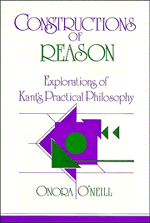Book contents
- Frontmatter
- Contents
- Preface
- List of abbreviations
- Part I Reason and critique
- 1 Reason and politics in the Kantian enterprise
- 2 The public use of reason
- 3 Reason and autonomy in Grundlegung III
- 4 Action, anthropology and autonomy
- Part II Maxims and obligations
- Part III Kant's ethics and Kantian ethics
- References
- Index
2 - The public use of reason
Published online by Cambridge University Press: 05 June 2012
- Frontmatter
- Contents
- Preface
- List of abbreviations
- Part I Reason and critique
- 1 Reason and politics in the Kantian enterprise
- 2 The public use of reason
- 3 Reason and autonomy in Grundlegung III
- 4 Action, anthropology and autonomy
- Part II Maxims and obligations
- Part III Kant's ethics and Kantian ethics
- References
- Index
Summary
Liberals often think that diversity of belief and its expression should be tolerated if we are to respect either individuals or reason and truth themselves. Because they are “agnostic about the good for man”, they hold that liberty for each to pursue his or her conception of the good in “self-regarding” matters is required, and that practices of toleration are important aspects of this liberty. They also often advocate practices of toleration as means by which reasoned and true beliefs can come to prevail over false beliefs. Each line of thought justifies practices of toleration as means to something that is seen both as logically independent and as of more fundamental value.
These familiar lines of thought are not the only possible liberal vindication of toleration. In Kant's writings toleration is not a derivative value, to be established only when the value of true and reasoned belief and of liberty in self-regarding matters has been established. His arguments for toleration of what he terms “the public use of reason” presuppose neither that there are antecedently given standards of rationality nor that any class of self-regarding individual actions is of special importance. For Kant the importance of (some sorts of) toleration is connected with the very grounding of reason, and so in particular with the grounding of practical reason.
- Type
- Chapter
- Information
- Constructions of ReasonExplorations of Kant's Practical Philosophy, pp. 28 - 50Publisher: Cambridge University PressPrint publication year: 1990
- 1
- Cited by



